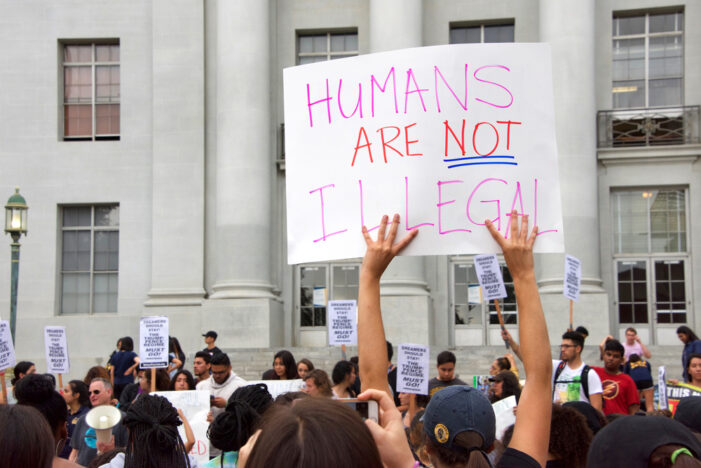By JR Holguin
Editorial credit: Sheila Fitzgerald / Shutterstock.com
Eleven years since the creation of DACA, Dreamers continue facing the uncertainty of deportation due to the 2021 ruling by a Texas judge declaring it illegal, barring new recipients from applying and leaving the fate of DACA uncertain.
The ruling by U.S. District Judge Andrew Hanen declared the program illegal, halting all new applications from an estimated 400,000 eligible Dreamers, as DACA recipients are known, but allowing those with existing DACA status to continue applying until a final verdict is reached.
The Legal Battle
Texas v. United States is being decided in the Southern District of Texas by Judge Hanen, the same judge that ruled President Barack Obama’s memorandum illegal. After that verdict in 2021, the Biden administration updated the program and sent it back to Hanen.
Now nine states are suing DACA, claiming that the program has caused financial harm by spending millions of dollars providing benefits such as health care and education to Dreamers. The states are Texas, Alabama, Arkansas, Louisiana, Nebraska, South Carolina, West Virginia, Kansas, and Mississippi.
Lawyers for the Biden administration and the Mexican American Legal Defense and Educational Fund are defending DACA and arguing that the program is legal and that there is no proof of financial harm.
Hanen has yet to rule and said he would have one “as soon as possible.” Experts said they expected the case to return to the Fifth Circuit Court of Appeals and possibly reach the U.S. Supreme Court. The estimated time for a conclusion˜ is uncertain.
Economic and Social Implications
According to FDW.us, “the end of DACA will impact over 600,000 DACA recipients — resulting in an average of 5,000 DACA recipients falling out of status and losing work authorization every single week over the next two years,” with economic consequences concentrated in 12 states across the nation where most Dreamers live.
In 2023 86% of all Dreamers participate in the labor force and contribute billions of dollars of combined taxes towards the economy. FDW.us also estimates that if DACA is fixed, it could allow eligible individuals to contribute at least $390 billion in wages and $117 billion in combined taxes over the next decade.
Heramb Mohite, a sophomore at University of Colorado Boulder, is one of tens of thousands of ‘Documented Dreamers’ who face self-deportation when they turn 21. He said in an interview with Boulder Reporting Lab, “My automatic loss of legal status at 21 is a baffling rule in our immigration system. Why would America recruit foreign talent like my father, educate kids like me at taxpayer-funded schools and then deport us just as we reach working age? There are more than 200,000 young people like me, and nearly 90% are pursuing or plan to pursue STEM and healthcare careers. We have become known as “Documented Dreamers,” and we’ve been advocating for the America’s Children Act, a bipartisan bill introduced in Congress last month that fixes a loophole that forces American-raised and educated children to leave the country.”
Texas, leading the lawsuit, has the second highest population of Dreamers – behind California – with an estimated 96,000 recipients, 73% of them in the labor force and close to half with some college education. DACA recipients hold different positions in the labor force, including essential jobs, like the 30,000 healthcare workers, such as doctors and nurses.
The Department of Homeland Security (DHS) has assured that applicants are not a deportation priority and are following the current policy prohibiting DHS from sharing the provided information with other entities within the department, such as Immigration and Customs Enforcement (ICE), unless specific circumstances involving fraud, national security threats, or public safety concerns arise.
In a recent interview with Congresswoman Yvette Clarke, the importance of legislation like the Dream and Promise Act became abundantly clear. This legislation, which aims to establish a pathway to citizenship for those brought to the United States as children, can potentially transform countless individuals’ lives.
Rep Clarke explained, “The Dream and Promise Act is a piece of legislation passed in the House of Representatives several years ago during the Obama administration. Unfortunately, it wasn’t taken up by the Senate and has yet to become law. It’s an Obama-era program that would essentially provide a pathway to citizenship for those who were brought to the United States as children and have been in a state of limbo with no status in the United States. As a result, many who were brought here as children are now adults and have lived a life in this country, contributing to everything from our military to various aspects of our civil society. Yet they remain in the shadows simply because they lack status. The Dream and Promise Act would rectify that, giving these individuals the status, they need to continue with their lives to strengthen their families and communities. And so, eleven years ago, this legislation was put in motion, and we are bringing light to that and reintroducing the legislation once again.”
“The ability to receive the earned benefit of being an American, whether it’s Social Security, Medicare, healthcare services, all of those things that American citizens take for granted have been denied to these individuals,” added Clarke.
Clarke passionately highlighted the immense contributions these Dreamers have made, from serving in the military to participating in civil society actively. Despite their valuable contributions, their lack of legal status has relegated them to the shadows. With over 580,000 recipients living in perpetual uncertainty, Congresswoman Clark emphasized the pressing need to pass this crucial legislation. Moreover, she shed light on the broader issue of comprehensive immigration reform, underscoring the importance of addressing immigrant communities’ challenges.
But more is needed for Dreamers, and they deserve better.
In addition to their economic contributions, it is crucial to recognize Dreamers’ emotional and inspirational journeys. These resilient individuals have spent the majority, if not all, of their lives in the United States, with no other place to call home. They attend American schools and colleges, own small businesses, hold essential jobs, establish families, and invest in houses. Their roots are firmly planted in this country, and 11 years later have now intertwined their identities with its very fabric.
The majority of the country agrees that Congress needs to create a path to citizenship for these individuals who are a part of this country as much as anyone else simply because they were born here. In a statement released by President Joe Biden, he says, “Dreamers are Americans,” but it’s time to stop calling the individuals Dreamers anything other than what they are, American.




